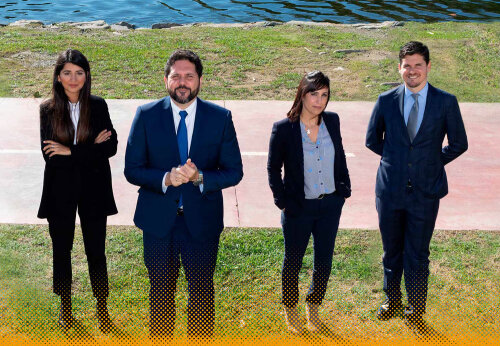Best Collaborative Law Lawyers in Fuengirola
Share your needs with us, get contacted by law firms.
Free. Takes 2 min.
Free Guide to Hiring a Family Lawyer
List of the best lawyers in Fuengirola, Spain
About Collaborative Law in Fuengirola, Spain
Collaborative Law is a modern approach to resolving legal disputes, especially in family and civil matters, without going to court. In Fuengirola, Spain, this process involves all parties working together with their respective lawyers to reach a mutually acceptable agreement. The collaborative method focuses on open communication, transparency, and a commitment to resolving matters amicably. Unlike traditional litigation, Collaborative Law aims to reduce conflict, cost, and emotional stress, making it an increasingly popular option for residents and families in Fuengirola.
Why You May Need a Lawyer
People may require legal advice or representation in Collaborative Law for several reasons. Common scenarios include divorce or separation, child custody and support agreements, property division, business partnerships, and inheritance disputes. Engaging a lawyer in these situations can help ensure your interests are protected, all legal requirements are met, and the process remains fair and equitable. A lawyer experienced in Collaborative Law in Fuengirola can guide you through negotiations, draft legally binding agreements, and help resolve disputes without resorting to litigation.
Local Laws Overview
Collaborative Law is influenced by both Spanish national legislation and the specific practices adopted in Andalusia, the region where Fuengirola is located. Spanish law recognizes the autonomy of parties to resolve their disputes outside of court, particularly in family law. Agreements reached through Collaborative Law must comply with the Spanish Civil Code and, in the case of family issues, require judicial approval to become legally enforceable. The collaborative process in Fuengirola typically involves a series of meetings where both parties, their lawyers, and sometimes neutral experts (such as financial advisors or child specialists) work together to find solutions that respect everyone's interests.
Frequently Asked Questions
What is Collaborative Law and how does it differ from traditional litigation?
Collaborative Law is a non-adversarial process where parties work together with their lawyers to resolve disputes out of court. Unlike litigation, it focuses on cooperation and mutual agreement, often leading to less conflict and faster resolution.
What kinds of disputes can be resolved using Collaborative Law in Fuengirola?
Collaborative Law is most often used for family law matters such as divorce, child custody, and inheritance disputes, but it can also be applied to business disagreements and civil partnerships.
Do both parties need to agree to use Collaborative Law?
Yes, both parties must voluntarily agree to use Collaborative Law and commit to resolving their issues without resorting to court proceedings.
What role does the lawyer play in the collaborative process?
Each party has their own lawyer who guides them through negotiations, ensures their interests are represented, explains the legal implications of the decisions, and drafts agreements.
What happens if the collaborative process breaks down?
If the process fails, both collaborative lawyers are typically disqualified from representing their clients in future litigation related to the dispute, encouraging all participants to remain committed to cooperation.
Are agreements reached through Collaborative Law legally binding?
Once an agreement is reached, it can be formalized in writing and, for family law matters, submitted to court for approval, making it legally enforceable under Spanish law.
How long does the Collaborative Law process usually take?
The duration varies depending on the complexity of the issues and willingness of the parties to cooperate, but it is generally faster than traditional litigation.
What are the main benefits of Collaborative Law?
The main benefits include privacy, reduced conflict, more control over the outcome, cost savings, and solutions tailored to the needs of all parties involved.
Can children’s interests be represented in Collaborative Law?
Yes, neutral child specialists can be involved in the process to ensure that the best interests of children are prioritized in any agreement.
Is Collaborative Law recognized and enforced by the courts in Fuengirola?
Court approval is required for family agreements, and courts in Fuengirola recognize and enforce settlements that comply with legal standards and protect the rights of all involved.
Additional Resources
If you need more information or support regarding Collaborative Law in Fuengirola, the following resources may be helpful:
- Bar Association of Malaga (Ilustre Colegio de Abogados de Málaga) offers a directory of qualified collaborative lawyers. - Local legal aid offices (Oficina de Asistencia Jurídica Gratuita) can provide guidance on eligibility for free legal services. - Mediation and family support centers in Fuengirola and Málaga for neutral expert involvement. - The Council of Andalusia’s Justice Department for information on mediation and out-of-court dispute resolution.
Next Steps
If you are considering Collaborative Law for your legal issue in Fuengirola, the first step is to consult with a qualified collaborative lawyer. Arrange for an initial meeting to discuss your case, learn about your options, and determine whether the collaborative process is suitable for your situation. Be prepared to share all relevant documents and information, and stay open to working cooperatively with all parties involved. If agreement is reached, your lawyer will draft the necessary documents for court approval if required. Taking timely action and seeking professional legal advice ensures the process is smooth and your rights are fully protected.
Lawzana helps you find the best lawyers and law firms in Fuengirola through a curated and pre-screened list of qualified legal professionals. Our platform offers rankings and detailed profiles of attorneys and law firms, allowing you to compare based on practice areas, including Collaborative Law, experience, and client feedback.
Each profile includes a description of the firm's areas of practice, client reviews, team members and partners, year of establishment, spoken languages, office locations, contact information, social media presence, and any published articles or resources. Most firms on our platform speak English and are experienced in both local and international legal matters.
Get a quote from top-rated law firms in Fuengirola, Spain — quickly, securely, and without unnecessary hassle.
Disclaimer:
The information provided on this page is for general informational purposes only and does not constitute legal advice. While we strive to ensure the accuracy and relevance of the content, legal information may change over time, and interpretations of the law can vary. You should always consult with a qualified legal professional for advice specific to your situation.
We disclaim all liability for actions taken or not taken based on the content of this page. If you believe any information is incorrect or outdated, please contact us, and we will review and update it where appropriate.











